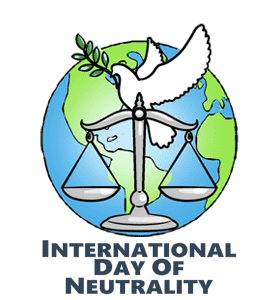

International Day of Neutrality
Quick Facts - AU
| HashtagsCompiled on | #InternationalDayofNeutrality |
|---|---|
| Related Hashtags | #Neutrality |
| 2023 Date | 12 December 2023 |
| 2024 Date | 12 December 2024 |
2023 Holidays & Dates
| Australian & Common Holidays | ||
| Misc. & Int'l. Observances | ||
| Christian Holidays | ||
| Jewish Holidays |
|
|
|
|
